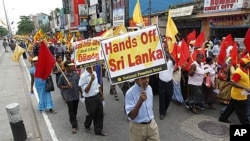Tens of thousands of Sri Lankans rallied in Colombo Sunday to protest a U.N. report that says the government may have committed serious human rights violations in the final months of a civil war that ended in 2009.
Sri Lankan President Mahinde Rajapakse's ruling party organized the anti-United Nations protest to coincide with May Day, a traditional day of international demonstrations for workers' rights.
Mr. Rajapakse told the crowd that government troops fought humanely against Tamil rebels whom they defeated in May 2009, bringing an end to a 26-year conflict. He said Sri Lankan authorities provided food to captured fighters and rehabilitated them after the war, even providing a university education to some rebels who were trained to be suicide bombers. The Sri Lankan president asked rhetorically whether such actions amounted to human rights violations.
Three U.N. experts published a report on Sri Lanka's civil war last Monday, saying they found "credible allegations" of war crimes and crimes against humanity on the part of the government and the rebels.
Colombo has rejected the findings of the U.N. panel led by former Indonesian Attorney General Marzuki Darusman, calling them an attempt to undermine Sri Lanka's postwar reconciliation process. In his speech, Mr. Rajapakse appealed to unspecified organizations and individuals not to tarnish his country in return for "dollars." He did not elaborate.
President Rajapakse said his government carried out a major humanitarian operation in the final stages of the war to rescue more than 300,000 people from the "clutches" of the rebels, as he put it.
The U.N. panel said it found evidence of Sri Lankan troops killing many civilians through widespread and indiscriminate shelling of hospitals and other humanitarian facilities during the period. It also cited allegations of the rebels using civilians as human shields, holding civilians as hostages and recruiting child soldiers.
Sri Lankan Power and Energy Minister Champika Ranawaka told the anti-U.N. protesters that the people must unite to protect themselves from what he called "international conspiracies." Some demonstrators burned an effigy of U.N. Secretary-General Ban Ki-moon and carried signs mocking the U.N. chief as they marched to the grounds of Colombo's Town Hall.
Mr. Ban has said he will launch an international investigation of the allegations in the report only if the Sri Lankan government agrees or if U.N. member states call for such a move.
U.S. Assistant Secretary of State for South and Central Asian Affairs Robert Blake is expected to discuss the U.N. report with Sri Lankan government officials during a visit to that nation in the coming days.
Some information for this report was provided by AP and AFP.




